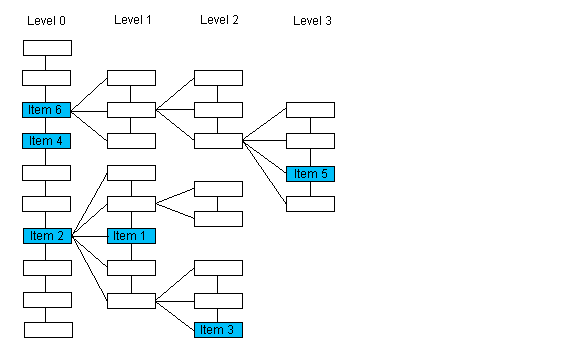| LEADTOOLS DICOM C DLL Help > Function References > L_DicomGetRootIOD |
#include "Ltdic.h"
L_LTDIC_API pDICOMIOD L_DicomGetRootIOD(pIOD)
|
pDICOMIOD pIOD; |
/* pointer to a DICOMIOD structure */ |
Returns a pointer to the root of the specified item.
|
Parameter |
Description |
|
pIOD |
Pointer to a DICOMIOD structure that contains an item in the IOD Structure. |
Returns
|
!NULL |
A pointer to a DICOMIOD structure that contains the item in the IOD Structure that is the root of the item specified in pIOD. |
|
NULL |
The IOD Structure is empty or pIOD is NULL. |
Comments
The root is the Level 0 ancestor of pIOD. If pIOD points to an item on Level 0, a pointer to that same item will be returned. Please note that the numbering of the items in this illustration is arbitrary and does not imply order.

|
If the passed pointer points to : |
The function returns a pointer to : |
|
Item 1 |
Item 2 |
|
Item 3 |
Item 2 |
|
Item 4 |
Item4 |
|
Item 5 |
Item 6 |
The following functions will also help you navigate the IOD Structure:
Required DLLs and Libraries
|
For a listing of the exact DLLs and Libraries needed, based on the toolkit version, refer to Files To Be Included With Your Application |
Win32, x64, Linux.
See Also
Example
This example displays the root's name of an item.
L_INT DicomGetRootIODExample(L_VOID)
{
pDICOMIOD pRoot;
pDICOMIOD pElement;
pElement = L_DicomFindIOD(NULL, TAG_PATIENT_NAME, IOD_TYPE_ELEMENT, FALSE);
if (pElement != NULL)
{
pRoot = L_DicomGetRootIOD(pElement);
MessageBox(NULL, pRoot->pszName, TEXT("Notice"), MB_OK);
}
return DICOM_SUCCESS;
}